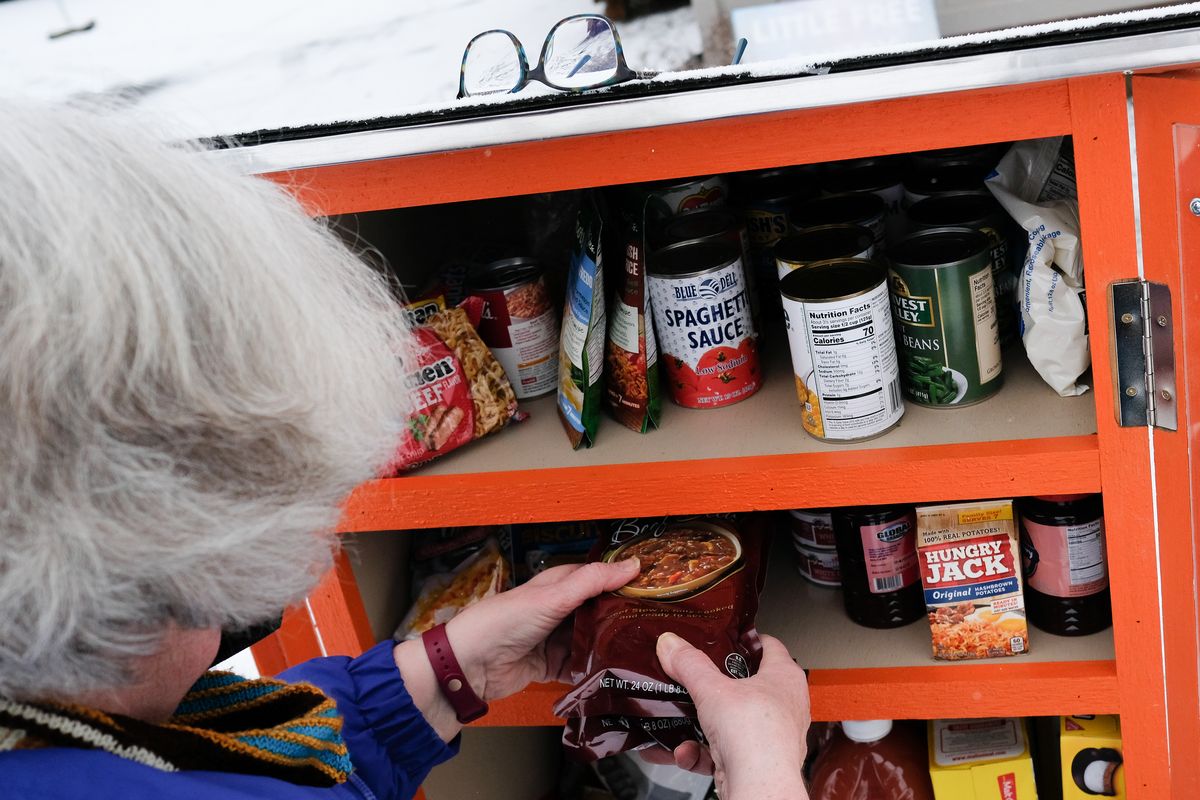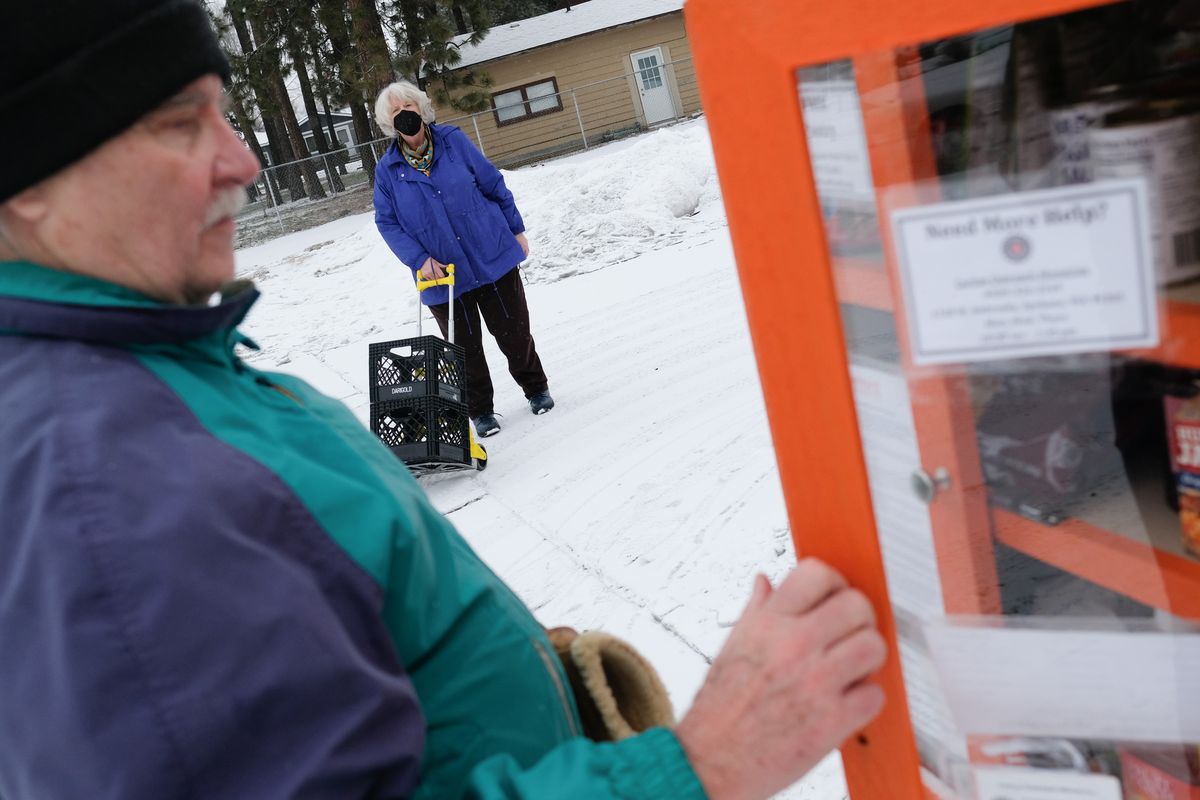Helping neighbors in need: Spokane’s Little Food Pantry sites grow as families juggle pandemic losses, inflation
Bev Hopoi rests her glasses in the snow as she fills a Little Free Pantry at the site of Caritas Outreach Ministries on Tuesday at 1228 W. Nebraska Ave. A grassroots effort to build Little Free Pantry sites nationwide also is on the uptick in Spokane’s region, growing to about 48 mini cupboards filled with items for a meal or two. (Tyler Tjomsland/The Spokesman-Review)Buy a print of this photo
A grassroots effort to build Little Free Pantries nationwide has seen an uptick in the Spokane region, growing now to about 48 mini cupboards filled with items that people can use for a meal or two.
In Spokane Valley, the South Hill and the city of Spokane, each one is stocked with items such as peanut butter, canned ravioli and dry pasta, along with some personal hygiene items. A little pantry itself often is built on a post in a yard, at churches and near public building entrances.
A Little Free Pantry Spokane Facebook page, now with more than 2,200 followers, maps the area’s pantry locations and helps neighbors share information. In 2018, Caritas Outreach Ministries in Spokane started the mission here by installing four pantry sites, with a startup donation from Spokane Rotary 21 Club.
Today, Caritas continues to stock about 15 pantries, while neighbors and churches take care of the rest.
“Caritas sponsors about 15 of them locally,” said Kelsie Rowland, Caritas food pantry manager. “There is a new Facebook group called Little Free Pantry Spokane, and they have been going around and supporting the little free pantries.
“We’ve also been working with private individuals who will come to us and get some food to fill their little pantries, or just within the community, there’s a whole network of folks who will post that this one is empty, and within a few hours, somebody has filled it. There are people asking about where they are or to say I’m in need of a specific item.”
Some recipients will leave notes of thanks and say how it relieved a family hardship. The boxes provide 24/7 access in a hyperlocal setting without any paperwork or photos taken, Rowland said. She said the local Facebook group lists many of the new pantries that aren’t necessarily on a national map at littlefreepantry.org.
Caritas also serves as a free resource for people wanting to create a little pantry. It can help residents find plans for construction, offer information on liability concerns or answer questions.
Rowland said people want to think through any potential neighborhood concerns while perhaps checking with a homeowner’s insurance company to ensure that a pantry won’t affect cost. People should call 811 before digging to notify utilities and avoid blocking right-of-ways.
“We don’t want anybody to get really excited and then get hit with something later they weren’t expecting or have an upset neighbor,” Rowland said. “There are free plans online, or they are welcome to build their own, or a lot of people repurpose a hutch or cupboard.”
Since 2018, the use of little pantries has taken off.
“We’ve definitely seen an uptick in use,” she said. “When we first started, we were committing to filling pantries at least once a week with a full load of food, and now we’re seeing them pretty much daily being emptied out. Maybe that’s just more people are becoming aware of them, but it also seems to be concurrent with the current prices and everything else going on, so a little bit of both, probably.”
Earlier during the pandemic, more people and children saw an increase in EBT, she said, and that’s also when pantry use for kid-friendly granola bars and apple sauces went down. But when that bump ended near fall 2021, items like those returned to being in high demand, Rowland said.
The overall goal is to pack the small spaces with generic pantry staples, from pasta and pasta sauce to the “open and eat items,” such as a can of ravioli or apple sauce and healthy snacks. “Trail mixes are great for instant energy, and then we try to include our contact information,” Rowland said.
That contact information invites a visit to Caritas’ food pickup location that can fill household meals lasting a week or longer.
“We’ve got fresh produce, bread, dairy products, pantry staples,” Rowland said. “And we have a necessity closet – which is another thing we do for the little pantries – personal hygiene products, cleaning items, all the things food stamps don’t buy but are necessary.”
Caritas operates its larger pantry three days a week for part of each day: 10:30 a.m.-1:30 p.m. Monday, Wednesday and Thursday at 1228 W. Nebraska Ave.
“We don’t have restrictions or boundaries if they show up and say they need food and found our information in a box,” Rowland said. “We will definitely give them more than a day’s worth of food. The idea is to try and meet need where it’s at, and then also if they’re able to get connected to further resources so they’re in a more stable situation.”
Northwest Harvest, a larger regional food bank, has bought building supplies in bulk to support new little pantries, she said. “I think they’ve done 24 pantries through Northwest Harvest funding just in the last year. They’re paying for the materials to build them.
“We’re getting the awareness out there, and people are really stepping up to fill them once they know one is close to them. Just this past weekend, a Girl Scout group collected 300 pounds of food and then went around to a bunch of pantries around Spokane and filled them over the weekend.
“If you need a little help, it’s there for you. There’s no having to explain your situation.”

